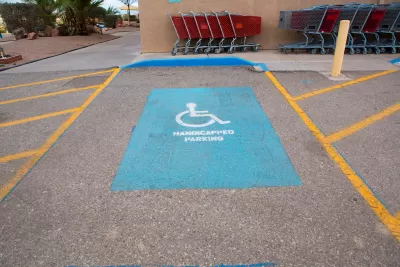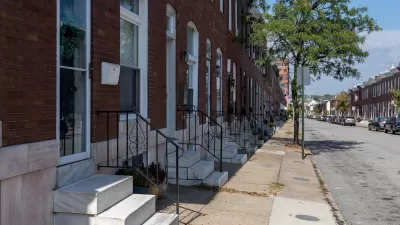Parking reform went into effect in Fairfax County, Virginia, in January, but county officials are considering tweaks to make sure the new regulations don’t lead to a decrease in accessible spaces.

“On the heels of new regulations that reduced parking ratios in some zoning areas, Fairfax County officials are recommending that the Board of Supervisors compensate by increasing parking requirements for accessible spaces,” according to an article in Gazette Leader. Writer Brian Trompeter reports that, shortly after new “Parking Reimagined” regulations were adopted in 2023, the board ordered county staff to work with stakeholders, Disability Services Board, and developers to ensure the new rules were in line with the Americans with Disabilities Act. The ADA requires the preservation of “a stable amount” of accessible parking even if general parking is reduced.
Parking Reimagined regulations, which went into effect in January, imposed a tiered structure for determining parking minimum requirements, mostly cutting them back in mixed-use areas near transit. Disability advocates have expressed concern that reduction in parking overall will lead to not only fewer but also less accessible spaces in terms of design; for example, “motorists sometimes park or crowd upon ‘hatched’ areas buffering accessible spaces,” which blocks necessary room for wheelchair ramps or lifts. After several months of research county staff have “recommended increasing the ratio for accessible spaces from 1-to-25 under the Virginia Uniform Statewide Building Code to 1-to-15,” writes Trompeter, and hope to have a zoning ordinance amendment drafted by 2025.
Fairfax County’s move to amend its recently passed parking reform regulations is noteworthy not just because it will ensure accessibility for their local disability community but also because they recognized a potential mistake and course corrected by employing or engaging directly with disabled people — something disability and Universal advocates say does not happen enough. Steven Wright, a planner, writer and educator in Universal Design, stated as much in a Streetsblog USA article outlining three myths about what parking reform could mean for disability challenges:
“As much as I love and admire the planning industry, I think it’s doing a horrible job of seeking input from people with disabilities," he adds. “If you don’t have people with disabilities working on your staff, you’re going to presume a lot of things [about how they live and move] that just aren’t true,” Wright said.
FULL STORY: Fairfax leaders may require more parking for those with disabilities

Planetizen Federal Action Tracker
A weekly monitor of how Trump’s orders and actions are impacting planners and planning in America.

DARTSpace Platform Streamlines Dallas TOD Application Process
The Dallas transit agency hopes a shorter permitting timeline will boost transit-oriented development around rail stations.

Congressman Proposes Bill to Rename DC Metro “Trump Train”
The Make Autorail Great Again Act would withhold federal funding to the system until the Washington Metropolitan Area Transit Authority (WMATA), rebrands as the Washington Metropolitan Authority for Greater Access (WMAGA).

Supreme Court Ruling in Pipeline Case Guts Federal Environmental Law
The decision limits the scope of a federal law that mandates extensive environmental impact reviews of energy, infrastructure, and transportation projects.

Texas State Bills to Defund Dallas Transit Die
DART would have seen a 30% service cut, $230M annual losses had the bills survived.

Bikeshare for the Win: Team Pedals to London Cricket Match, Beats Rivals Stuck in Traffic
While their opponents sat in gridlock, England's national cricket team hopped Lime bikes, riding to a 3-0 victory.
Urban Design for Planners 1: Software Tools
This six-course series explores essential urban design concepts using open source software and equips planners with the tools they need to participate fully in the urban design process.
Planning for Universal Design
Learn the tools for implementing Universal Design in planning regulations.
Roanoke Valley-Alleghany Regional Commission
City of Mt Shasta
City of Camden Redevelopment Agency
City of Astoria
Transportation Research & Education Center (TREC) at Portland State University
US High Speed Rail Association
City of Camden Redevelopment Agency
Municipality of Princeton (NJ)





























